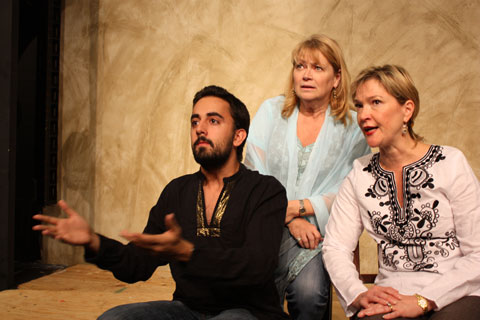
SO SARI Like its characters, the play too seems to be on a bit of a chase |
You know you're in trouble when the actors are more compelling than the play. Alas, that's true of Leslie Harrell Dillen's Two Wives in India in its world premiere from Boston Playwrights' Theatre (through November 21). Dillen's serial wives, Americans whose shared husband has died, are in India to celebrate the engagement of Emily — Becca's daughter and Mary Jo's stepdaughter — to a Sikh man who resides in New York but whose family is in Delhi. Although there is no love lost between Becca and Mary Jo, the two are on board for a hectic if underpopulated Indian travelogue celebrating both love beginning and love being let go of.
Here, in a ritualistically frolicsome staging by M. Bevin O'Gara, the wives are played by a razor-sharp Amelia Broome and a radiantly flaky Karen MacDonald, the latter's Mary Jo clinging to a large purse full of the husband's ashes — for which residue she is determined to secure a part in the traditional Indian engagement ceremony. Attempting to keep the peace is Ben Martin's soulful Jaskanvar, the prospective son-in-law. The rest of India, from Jaskanvar's hovering parents to impoverished hordes and Puckish spirits, is represented by Asa Bhulyan and Robert Saoud, the latter also standing in for enthused if spectral father-of-the-bride Sam. Unseen is the culture-embracing Emily, here assigned what you might have thought the ashes' job of blowing in the wind.
In a brief program interview, Dillen reveals that the play is autobiographical and has undergone numerous revisions, moving from solo to multi-character work — which may be why it sometimes smacks of Bollywood on a shoestring. But in terms of her characters, the veteran scribe proves an equal-opportunity inhabitant. It's difficult to guess which of the title women enduring death-defying Delhi traffic and throwing themselves into the dance of a henna party springs from personal experience.
On the surface, the two wives are clashing types, Becca a successful interior designer afraid of losing her daughter, Mary Jo a Midwestern romantic aspiring in her bereavement to become a sort of Oklahoma Barbara Cartland. What they share are unresolved hostilities, ongoing attachments to Sam, and an Ugly Americanism lurking beneath their peripatetic Indian holiday's trans-cultural embrace. Fluttery Mary Jo is initially more worried about unfamiliar food and non-Western toilets. But in one spat, Becca accuses her successor of foisting The English Patient onto her impressionable stepdaughter, thus revving up Emily to fall in love with "the first turban" she saw.
As invisible Emily and her two increasingly frazzled moms are whisked by Jaskanvar's numerous if minimally represented relatives from Delhi to Chandihar to Agra, the play, too, seems on a bit of a chase. A key scene at an ancient temple suggests that Dillen means the work, in part, to be about parents giving their children wings to fly free of them, their cultures, and their prejudices. Sometimes, though, it just seems like a more dignified Dynasty catfight between the wives. The piece would probably benefit from letting us see Emily instead of avuncular dead people.